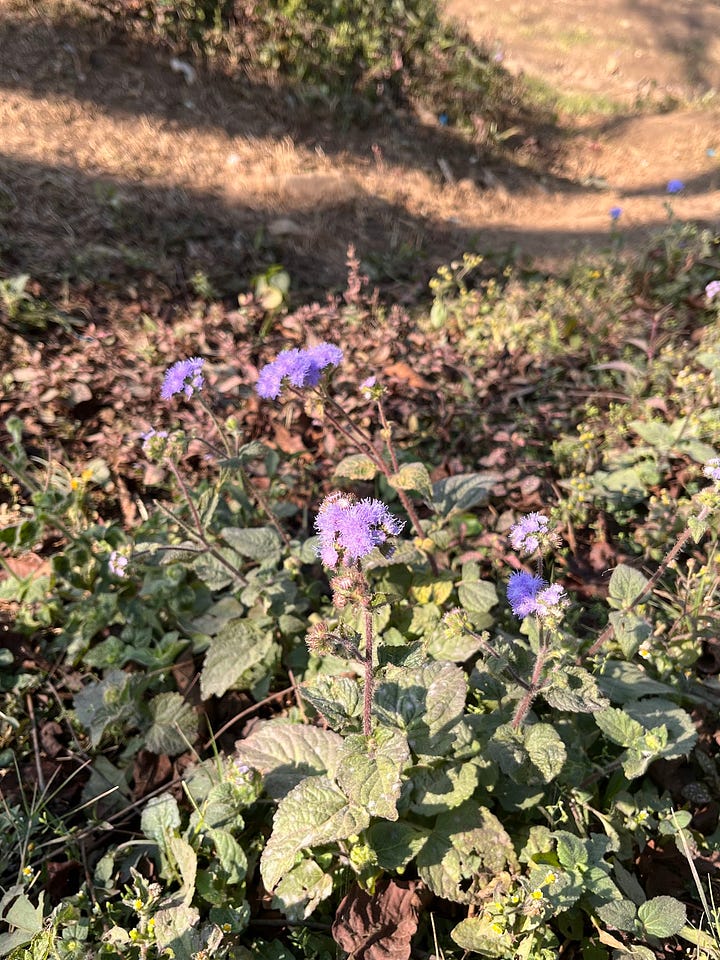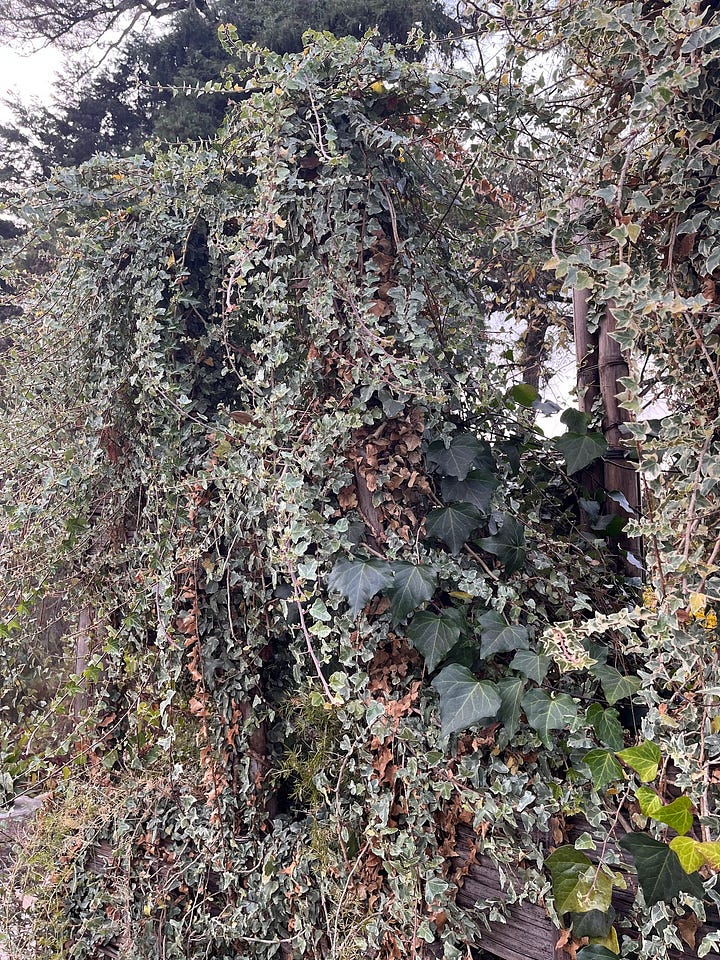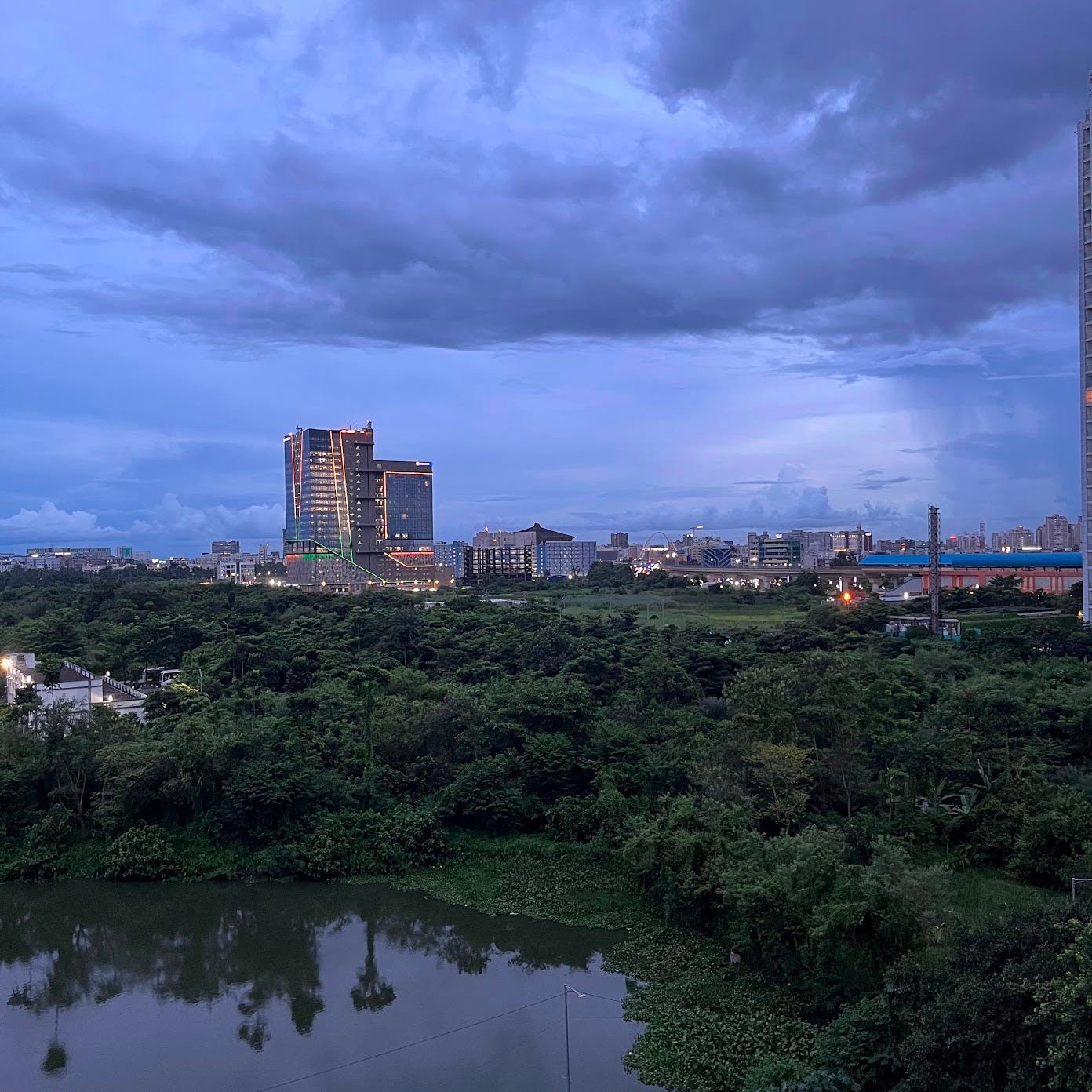Namaste Friends,
I have been sitting here in the unfurling of stormy clouds passing over me, feeling caged in my concrete and glass tower. Caged—an unsuspecting word that postulates the sensation of isolation. But words are concepts of the experience rather than the experience itself. What I feel is beyond the subtle separation from the life around me. I feel deeply solitary and poised to observe—the long stretch of road with its busy passersby, the evening lights rising against the faint sapphire of dusk. In the distant roar of the purple fault lines, I dissolve into the distinct silence of my inner solitude. When I lean in, I hear nothing but a stillness that doesn’t respond—it only observes.
This year began with us moving to a new apartment. I quickly set about unpacking things and arranging them in order, while Ak got busy fixing the plumbing and electrical fittings. It took us quite some time before we found our new rhythms and relaxed into them. The beginning of the monsoon brought a pair of adolescent starlings to my hearth. At the break of dawn, they perched on my cloth rack and cried with their beaks open, looking at the horizons above as if hoping to be fed by an invisible mother.
We belonged to two different worlds—the birds and I. They, inhabiting an eternal wild—wilful and boundlessly large; I, living inside a carefully curated but ultimately inverted dream of the collective human psyche. They, soaring through the piercing light of presence; I, relegated to the shadows of the mind. They carefully pruned their feathers to dry off the stormwater and side-eyed me—consciousness simultaneously beholding and beheld.
They call at times for my attention, but most often there is a sacred and shared silence between us. Silence — that portal, a rupture through which understanding travels without language.
They started to visit us often, almost regularly—picking a fight or two with Maya through the glass screen, like internet strangers bickering—and then leaving before noon. Our balcony became their perch, a resting place while they scavenged and sang, collected and splattered. Each day, I would find all kinds of unremarkable litter on my balcony—ranging from dry breadcrumbs to half-eaten potatoes, bamboo grass, and sometimes even hay and sticks. I was not sure if they were scouting for a place to build their nest, but they earnestly seemed to be searching for safety.
I mysteriously developed a persistent and prolonged migraine attack during those initial monsoon months. My days were filled with pressure and pain in my cranium, and my nights with vivid nightmares. My brain waves felt all meddled, and I started losing the sense of distinction between waking and dreaming. I lucidly blended into both without much protest. I retreated into silence for most of the day.
It was then that I started sensing a quiet stir, a faint movement of thoughts through my head—a ghostly, unmasked voice that murmured. Astounded, I sat with patience to discern its locus, but to no avail. The gossamer veil lifted so softly that the silence itself became the sound. It was in this dialect of the indiscernible that I found an instruction so clear, it seemed as if someone next to me had whispered it in my ear: Feed me. It rushed through my blood, a soundless message—a trans-species language that I tuned into.


We often deliberately forget that the mysteries of this universe lie in its shared experience with other beings, with life and frequency of all kinds. The magic of interspecies communication is as natural as the magic of trees growing toward the sky while drinking sunlight and minerals.
On receiving my instruction one warm morning, I prepared some soaked rice grains and offered them to the pair of starlings. They lapped it up with enthusiasm and chattered around all day long. One of their distant friend—a big, beautiful, spotless black myna—also visited and shared their spread.
Maya, like the diligent queen that she is, was distressed that her caretaker was probably exhausting the granary for a couple of miniature dinosaurs. She then reluctantly surrendered to their participatory joy, occasionally chirping and trilling to keep the birds from getting unruly. Tremendous emotions flowed seamlessly between the birds, the cat, and me, as we marvelled at our unlikely party.
I fed them for precisely two days, and then they suddenly disappeared. I told Ak that they were probably ancestors, here to settle some unfinished business with us. He zoned out for a while before muttering, “It was Papa and Vinnie.” We both smiled at that thought. The noise they had brought dissolved into silence. I glanced more often out at the balcony—the shadows chased the light along my laundry rack wall—but it no longer announced their arrival. They vanished without a feather’s trace in the wind, and so did my debilitating migraine.
Do I mean to suggest that my migraine was not a physiological condition but rather the psyche tuning into the whispers of the numen—like a radio catching a frequency long alienated by noise, like an ancient knowledge of a lost language? No, and yes. I mean to suggest it is both. Truths are not mutually exclusive. They live in realms beyond our constricted and polarized world of notions. And our brains are as much shadows as they are neurological miracles. Our bodies can respond to the subtle mystical shifts in profoundly physiological ways.
Sometimes malaise and madness are doorways—to a world beyond our fragmented sense of self, waiting to heal the parts of us we have unknowingly abandoned and exiled to the darkness of our inner realms.
Shadows are markers of presence in the kingdom of light. They broker a quiet peace between darkness and light. In darkness, they dissolve but remain ever present—invisible, yet persistently puppeteering our reactions to external triggers. They demand nothing but to be seen. Many versions of us live there—the insecure one, the angry one, the manic one, the depressed one, and all the other complex human parts that society insists we keep shut tightly in a dark box. But they are too heavy to live there without consuming us whole. So the box of shadow also becomes a box of opportunity. Each shadow contains within it a path of redemption from itself.
Meeting them in the dirty labyrinths and bloody alleyways of dreamscapes is nerve-wracking for me. But the strange gift is that, like every fear, they all disappear when I pay total attention without engaging with them. The light of presence is more powerful than a thousand shadows combined. Speaking strictly for myself, this is more than a woke theory.
Whenever I wake up with the remnants of a disturbing and confusing dream, I make it a point to re-enter the dream in my meditation intentionally—and subvert it, every single time. If I am stuck in a dreary place in the dream, I guide myself in meditation toward an exit. If I am confused or crying in the dream, I call upon my inner light to comfort me and guide me toward meaning. If I am running frantically from someone or something in my dream, I visualize myself as a mountain—steady and strong, ready to face all adversities.
My practice helps me process the unnamed weight of living.
The southern wind will soon depart, and the season of sound and light will slowly give way to the season of silence and darkness. From there will emerge beings obscured by the noise and activity of our hotter latitudes—the guardians of quietude. Jackals will return to run through the wild, wet plains, singing their fevered songs, and our dreams will quake to the mournful melodies of the Black-crowned Night Heron once again.1
I want to abide by the religion of forests. It is a wonder how every stone, every mycelial manifestation, speaks without a single syllable, and yet sustains a complex social life. I rely on the axis of power that birds wield as they spiral into the swelling storm and chase thunder with drenched wings. I lean into Maya’s wisdom, as she often retreats into quiet, dark corners to rest unhurried by the pace of the world.
I wait on the quietude of daybreak and nightfall, to whirl in the orbits of shadow and silence. To travel beyond the noise of the human-shaped prison that our society has become. To break truce with the self-importance of human existence. To be assured by the soft intimacy of the non-lingual world.



As usual with your posts Swarnali, there is so much for me to think about, nod my head to, smile at, feel seen and heard and understood by. But what I want to share is a some words that came to me a few days ago. The gist was a question, what if I started paying more attention to the “non lingual world” than I do to the human one? What would happen then? The question floats beneath the surface of my days now, in that beautiful silence. Thank you again. I’m amazed at how the words and the stillness float across continents. That we reach each other in this way. ❤️
It's taking me a while to catch up with what I missed while I was away, and then with everything I missed while I was catching up with what I missed, then... And I wanted to make sure I could give this piece the times it deserved. I'm glad I did.
This piece had me in a trance, right there with you and your temporary menagerie.
Thank you, Swarna. 🕯️